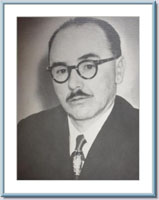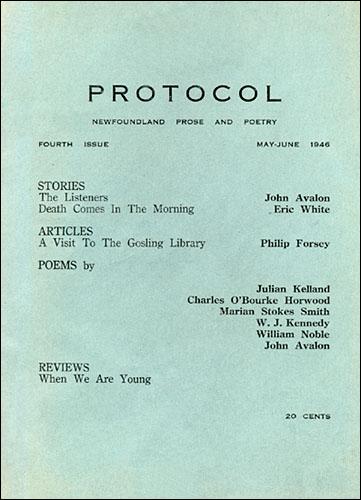W. Irving Fogwill (1901-1984)
Born in St. John's, NL, Irving Fogwill was a writer, labour leader and a leading voice for the confederates in the debate over the Newfoundland union with Canada. Fogwill went to work with the railway at the age of fourteen, eventually became involved with the Brotherhood of Railway Clerks and helped found the organization now known as the Newfoundland and Labrador Federation of Labour.

Prelude to Doom
A voracious reader, Fogwill began writing in the 1920s and published his first book of poetry, Prelude to Doom (London: Arthur H. Stockwell) in 1931. The poems, many of which were reprinted in the early volumes of The Book of Newfoundland, were remarkably modern in both form and content. The subject matter varies from a cradle song and a lament for wine to an ironic acclamation to Al Capone, but all the poems are informed by a keen social conscience and an awareness of the violence and poverty that mars so many lives. Several of the poems berate poets for ignoring the grim reality of life, and suggest they should come down from Parnassus and walk the cold, dirty streets of this world in order to find suitable subject matter for their poems. With the exception of an elegy to Varick Frissell, a filmmaker who died when the Viking exploded at the icefields the year the book was published, Fogwill makes no direct or indirect reference to Newfoundland in his early work.
Founding Protocol
During the 1930s, Fogwill became even more involved in labour issues and by 1938 he was editing The Labour Herald. He was the chief reporter and publicist for a series of protracted and bitter strikes that only ended with the outbreak of the Second World War, all of which had to be accomplished after his regular hours of work with the railway. At the end of the war, he helped organize the St. John's District Labour Party and campaigned successfully for several candidates to the National Convention, an elected body which was to recommend possible forms of future government for Newfoundland. At the same time, he helped found Protocol, an avant-garde literary review which briefly gained an international reputation in the larger literary world.
Fogwill contributed both fiction and poetry to Protocol under the pen name John Avalon, a name he had used extensively in his letters to newspapers. All his work paints an unremittingly grim picture of the futility of labour, the violence of life, the inevitability of death. Two of his Protocol contributions stand out for their subject matter; "The Listeners," a short story, and "Here is the Dread, Doomed Face," a poem, dealing directly with the Holocaust, the horror of which was just being revealed in the press. While most of the literary world reacted to revelations about the Holocaust with a stunned silence, Irving Fogwill wrote openly and bitterly about it. "The Listeners" was written after Fogwill heard a man in a local tavern remark with reference to the extermination of the Jews that "they can't kill too many of them for me."

The setting of most of Fogwill's work, even "The Listeners," is not recognizable as St. John's, although a few of Fogwill's later poems do refer directly to Newfoundland. "St. John's Woman," first published in The Newfoundland Quaterly, depicts a worn-out waterfront whore with sympathy and compassion. "Old Newfoundland Fisherman" is a more conventional portrait of dignity in old age.
Chairman of the Workmen's Compensation Board
In 1951 Fogwill was appointed Chairman of the newly formed Workmen's Compensation Board, a position he held until his retirement in 1967. During this time he appears to have written very little, nor did he produce a great deal after his retirement although a volume of selected works, A Short Distance Only (St. John's: Harry Cuff, 1981) was published with an introduction by Daphne L. Benson. Together with several articles on labour history, these works and the earlier Prelude to Doom make up the whole of Fogwill's known publications. The man who made hundreds of appearances on platforms and radio, who Joseph Smallwood called his single most valuable ally in the fight for Confederation, had become something of a recluse long before he formally withdrew from public life.
Harold Horwood, in an editorial in Protocol (3:3) described Fogwill's work as "possibly too good for Newfoundland," yet little seems to have been written about either Fogwill the man or his work, with the exception of a review in The Newfoundland Herald (Feb. 13, 1982, p.103) by a startled and awed Gervase Gallant. Gallant discusses the influences of Joyce, Beckett and others on Fogwill's work, but admits that comparison with rock lyrics, "thundering, direct, often brutal," might be more apt. Irving Fogwill is undoubtedly one of the most surprising and thoughtful writers to have worked in Newfoundland in the 20th century and deserves to be better known.




